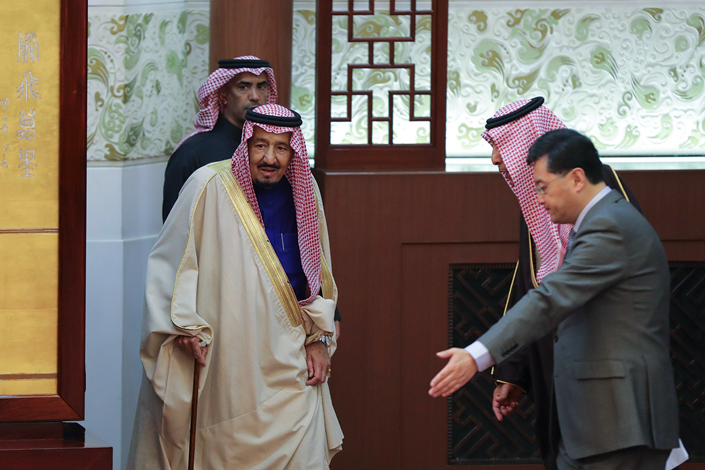China, Saudi Arabia Sign Deals Worth $65 Billion

(Beijing) – Saudi Arabia’s King Salman met with Chinese President Xi Jinping on Thursday, signing 14 deals worth about $65 billion.
The four-day visit has widely been seen as an attempt by Saudi Arabia to forge closer ties with China at a time when the Middle Eastern country has been experiencing economic pressures due to low oil prices, as well as growing insecurity in the wake of the U.S. lifting sanctions on Iran over its nuclear program.
This is the king’s first visit to China since ascending to the throne of the world’s largest oil exporter and comes 11 years after his predecessor, King Abdullah, visited China in 2006. Saudi Arabia is China’s largest foreign oil supplier.
The cooperative agreements included ones on energy, education and space science, the official Xinhua News Agency reported. Xi said the two sides will also discuss financial and investment cooperation, according to Xinhua.
One of the deals was signed between Sinopec, one of China’s largest state-owned oil companies, and Saudi Basic Industries Corp. (SABIC), which involves joint petroleum chemical projects in both countries, Sinopec announced Thursday.
Saudi Aramco, the world’s biggest energy company, also signed a memorandum of understanding with China’s state-run company Norinco on refining and chemical projects in China.
China National Petroleum Corp. and the country’s sovereign wealth fund China Investment Corp. have been in talks with Saudi Arabia to invest in what may be the world’s largest initial public offering by Saudi Aramco, according to a Bloomberg report on Thursday.
SABIC and Saudi Aramco have been investing in China for years.
Saudi Arabia has been China’s largest oil supplier for 16 years between 2000 and 2015, only losing out to Russia in 2016. But in January this year, Saudi Arabia became China’s No. 1 supplier again. China is also Saudi Arabia’s largest trade partner, with $42.36 billion of total trade between the two countries in 2016.
Experts say China’s “One Belt, One Road” economic initiative that aims to boost trade and cooperation along the ancient Silk Road across Asia and Europe fits well with Saudi Arabia’s “Vision 2030” to diversify its own economy.
When Xi visited Saudi Arabia in January 2016, the two countries signed deals on One Belt, One Road cooperation. In August, a special joint committee held its first meeting in Beijing to map out cooperation strategies. Now there are more than 130 Chinese companies investing in Saudi Arabia, covering energy, housing, port and road construction, and telecoms.
King Salman’s China visit is part of a month-long trip to six Asian nations.
Jin Liangxiang, a research fellow on West Asian and African affairs with the Shanghai Institute of International Studies, told Caixin that Saudi Arabia felt threatened by the U.S. lifting nuclear-related sanctions against Iran.
“The changing geopolitical situation, especially with China’s rising economic clout, has been pushing Saudi Arabia to look further to the East, besides maintaining traditional ties with the U.S.,” Jin said.
China-Saudi relations faced a setback starting in 2011 over differing views on the Syrian crisis, but since Xi’s 2016 visit, ties have improved, said Wang Tingyi, a Tsinghua University doctor and a research fellow with the King Faisal Center for Research and Islamic Studies.
Wang said strengthening trade and diplomatic ties with China will help Saudi Arabia deal with its economic difficulties amid low oil prices.
Contact reporter Wu Gang (gangwu@caixin.com)

- PODCAST
- MOST POPULAR






